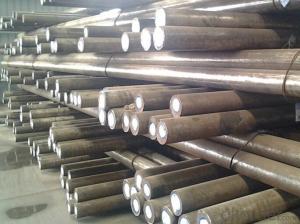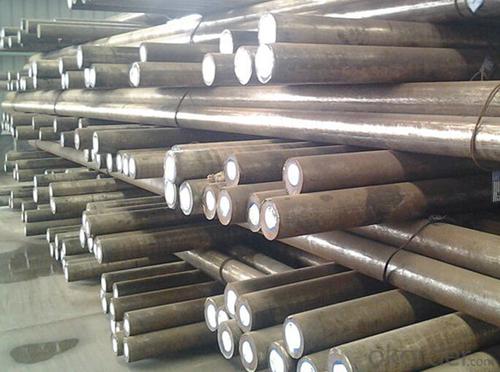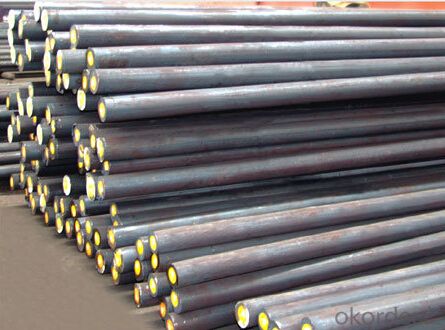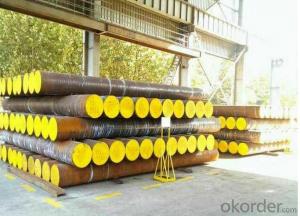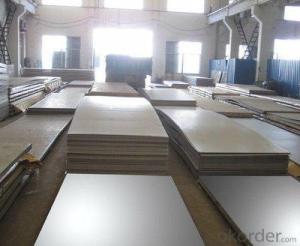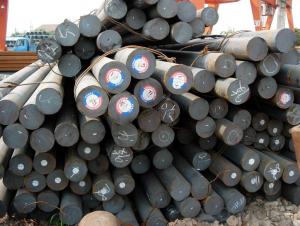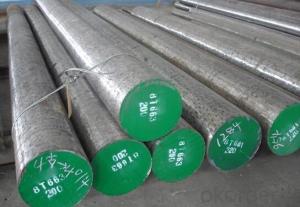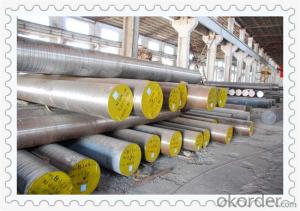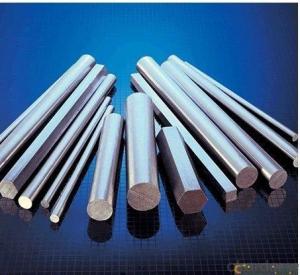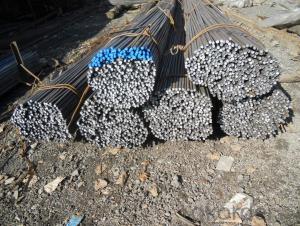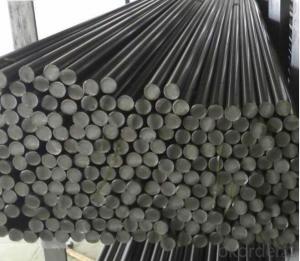Grade DIN41C4 alloy steel round bars Hot Rolled
- Loading Port:
- Tianjin
- Payment Terms:
- TT OR LC
- Min Order Qty:
- 3 m.t.
- Supply Capability:
- 10000 m.t./month
OKorder Service Pledge
OKorder Financial Service
You Might Also Like
Specification
Product Description:
1. Commodity: Round steel bar
2. Technical: Hot rolling
3. Length: Min. 5.8meter, according to requirement.
4.Diameter: 16mm-250mm
OKorder is offering Grade 41Cr4 alloy steel round bar at great prices with worldwide shipping. Our supplier is a quality manufacturer of steel, with our products utilized the world over. OKorder annually supplies products to European, North American,African and Asian markets..etd. We will quote you our most competitive prices within 24 hours after received the inquiry and guarantee the quality.
Product Applications:
Grade DIN41Cr4 Alloy steel round bar are ideal for structural applications and are widely used in the
Gear, Sleevesspool,Shaft, Crankshaft, Pin,Gear, Sleevesspool,Shaft, Crankshaft, Pin
Product Advantages:
OKorder's Grade DIN41Cr4 alloy steel are durable, strong, and resist corrosion.
Chemical Composition
Grade | C | Si | Mn | Cr | Ni | Cu | P | S |
40Cr | 0.37-0.44 | 0.17-0.37 | 0.50-0.80 | 0.80-1.10 | ≤0.30 | ≤0030 | ≤0.035 | ≤0.035 |
41Cr4 | 0.38-0.45 | ≤0.40 | 0.60-0.90 | 0.90-1.20 | ≤0.030 | ≤0.030 | ≤0.035 | ≤0.035 |
5140 | 0.38-0.43 | 0.17-0.37 | 0.70-0.90 | 0.70-0.90 | ≤0.030 | ≤0.030 | ≤0.040 | ≤0.035 |
Mechanical Properties
Grade | Tensile Strengthσb (MPa) | Yield Strength | Elongation | Reduction of Area ψ (%) | Impact Akv(J) | Hardness |
|
| |||||
σs (MPa) | δ5 (%) | |||||
41Cr4 | ≥980(100) | ≥785(80) | ≥9 | ≥45 | ≥47 | ≤207HB |
Packaging & Delivery
Standard seaworthy packing or as customer required
Leadtime
Delivery time: Within 30 days after order is confirmed.
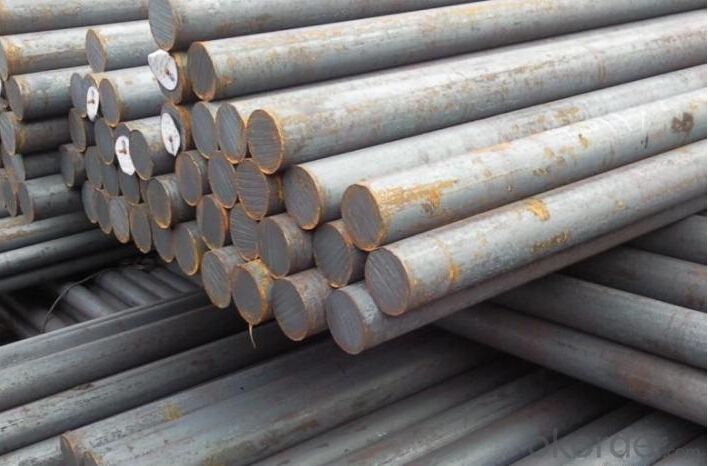
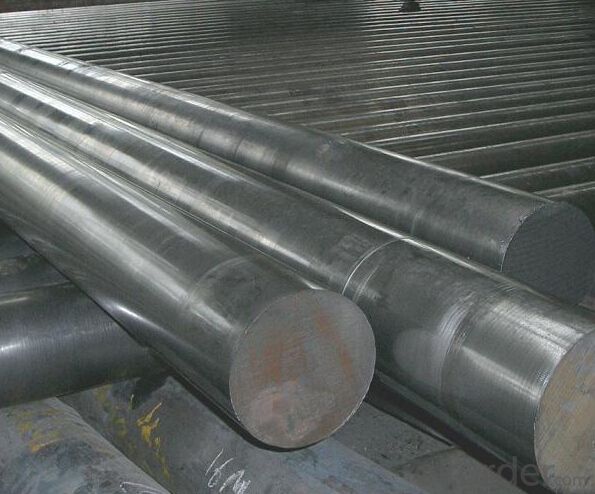
- Q: What are the different peening techniques used for special steel?
- There are several peening techniques used for special steel, including shot peening, ultrasonic peening, laser peening, and hammer peening. Shot peening involves bombarding the steel surface with small spherical particles to induce compressive stress and improve fatigue resistance. Ultrasonic peening uses high-frequency vibrations to create compressive stress and improve material properties. Laser peening involves using a high-energy laser to generate shockwaves and induce compressive stress. Hammer peening uses mechanical impact from a hammer or similar tool to create compressive stress on the steel surface. These techniques are utilized to enhance the durability, strength, and performance of special steel in various applications.
- Q: How are titanium alloys used in the medical industry?
- Titanium alloys are widely used in the medical industry due to their unique properties such as high strength, biocompatibility, and corrosion resistance. They are commonly used in medical implants, such as joint replacements, dental implants, and bone plates. These alloys promote better bone integration and reduce the risk of rejection or infection, providing patients with long-lasting and effective medical solutions. Additionally, titanium alloys are also used in surgical instruments and equipment, as they are lightweight and durable, enabling precise and efficient procedures.
- Q: How does special steel perform in high-stress environments?
- Special steel is specifically designed to perform exceptionally well in high-stress environments. Its unique composition and manufacturing process make it highly resistant to various forms of stress, such as mechanical, thermal, and chemical stress. One of the key properties of special steel is its high tensile strength, which allows it to withstand immense pressure without deformation or failure. This strength is achieved through the addition of alloying elements, such as chromium, nickel, and molybdenum, which enhance its structural integrity and toughness. The presence of these elements also increases the steel's resistance to corrosion and oxidation, making it more durable and reliable in harsh environments. Moreover, special steel exhibits excellent fatigue resistance, enabling it to withstand repetitive and cyclic loading without developing cracks or fractures. This property is crucial in high-stress environments where components are subjected to constant vibrations or cyclic loading, such as in aerospace, automotive, and industrial applications. In addition to its mechanical properties, special steel is also highly resistant to extreme temperatures. It can maintain its strength and integrity even at elevated temperatures, making it suitable for applications in high-temperature environments such as power plants, furnaces, and chemical processing industries. Furthermore, special steel has excellent wear resistance, which enables it to withstand abrasive conditions, such as those encountered in mining, construction, or manufacturing processes. This reduces the need for frequent maintenance or replacement, resulting in cost savings and increased productivity. Overall, special steel's exceptional performance in high-stress environments can be attributed to its unique combination of strength, durability, corrosion resistance, fatigue resistance, temperature resistance, and wear resistance. Its ability to withstand extreme conditions makes it an ideal choice for critical applications where reliability and safety are paramount.
- Q: What are the common challenges in welding titanium alloys?
- Some common challenges in welding titanium alloys include its high reactivity with oxygen, the formation of brittle intermetallic compounds, the need for precise temperature control due to its low thermal conductivity, and the potential for distortion or warping during the cooling process.
- Q: What are the applications of special steel in the nuclear industry?
- Special steel is extensively used in the nuclear industry due to its unique properties. It is used to manufacture various components such as reactor vessels, steam generators, and fuel cladding, which require high strength, corrosion resistance, and heat resistance. Special steel ensures the safety and efficiency of nuclear power plants by withstanding extreme temperatures, pressures, and corrosive environments. Its applications in the nuclear industry are crucial for maintaining the integrity and reliability of nuclear facilities.
- Q: How does special steel contribute to the energy sector?
- Special steel plays a critical role in the energy sector, contributing significantly to its efficiency, reliability, and safety. Firstly, special steel is used in the construction of pipelines and storage tanks, which are crucial components of the oil and gas industry. These pipelines need to withstand high pressures, extreme temperatures, and corrosive environments, and special steel provides the necessary strength and resistance to ensure their integrity and prevent leakage. In addition, special steel is utilized in the manufacturing of turbine blades and other components in power generation plants. These plants require materials that can withstand the high temperatures and pressures generated by the combustion of fossil fuels or the use of nuclear energy. Special steel's heat-resistant properties make it ideal for these applications, improving the overall efficiency and longevity of power plants. Furthermore, special steel is used in the production of wind turbines, which are rapidly becoming an essential source of renewable energy. The blades, tower structures, and gearboxes of wind turbines are subjected to significant stress and strain, and special steel provides the necessary strength and durability to withstand these conditions. By using special steel, wind turbines can operate reliably and efficiently, contributing to the growth of clean energy. Moreover, the energy sector relies on special steel for its infrastructure, such as transmission towers and substations. These structures need to support heavy loads and withstand extreme weather conditions while maintaining electrical conductivity. Special steel's high strength and corrosion resistance make it a suitable material for these applications, ensuring the reliable transmission and distribution of electricity. Overall, special steel plays a crucial role in the energy sector by providing the necessary strength, durability, and resistance to extreme conditions. Its use in pipelines, power generation plants, wind turbines, and infrastructure improves the efficiency, reliability, and safety of the energy sector, facilitating the production and distribution of both conventional and renewable energy sources.
- Q: How does special steel contribute to the manufacturing of precision components?
- Special steel plays a crucial role in the manufacturing of precision components by offering superior strength, durability, and resistance to wear and corrosion. Its unique properties allow for the production of complex and intricate parts that require high levels of precision and accuracy. Additionally, special steel often exhibits excellent machinability, enabling manufacturers to achieve tight tolerances and fine finishes. Overall, special steel enhances the performance and reliability of precision components, making it an essential material in the manufacturing industry.
- Q: How does special steel contribute to the manufacturing of cutting tools?
- Special steel is a key component in the manufacturing of cutting tools due to its exceptional properties such as high hardness, toughness, and wear resistance. These characteristics enable cutting tools to withstand the rigors of various cutting operations, ensuring longer tool life and improved cutting performance. Furthermore, special steel can be customized to meet specific requirements, making it an ideal choice for manufacturing cutting tools that are used in a wide range of industries, including automotive, aerospace, and manufacturing.
- Q: How is magnetic alloy steel used in the production of magnetic components?
- Magnetic alloy steel is used in the production of magnetic components due to its unique magnetic properties. It is commonly used to make permanent magnets, such as those found in electric motors, generators, and transformers. The alloy's high magnetic permeability and saturation induction make it ideal for creating strong magnetic fields. Additionally, its resistance to demagnetization and ability to retain magnetism at high temperatures make it suitable for various applications in industries like automotive, aerospace, and electronics.
- Q: What are the requirements for special steel used in defense equipment manufacturing?
- The requirements for special steel used in defense equipment manufacturing typically include high strength and durability, resistance to corrosion and wear, good toughness and impact resistance, as well as the ability to withstand extreme temperatures and harsh environments. Additionally, the steel must meet stringent quality control standards and industry specifications to ensure its reliability and performance in critical defense applications.
Send your message to us
Grade DIN41C4 alloy steel round bars Hot Rolled
- Loading Port:
- Tianjin
- Payment Terms:
- TT OR LC
- Min Order Qty:
- 3 m.t.
- Supply Capability:
- 10000 m.t./month
OKorder Service Pledge
OKorder Financial Service
Similar products
Hot products
Hot Searches
Related keywords
